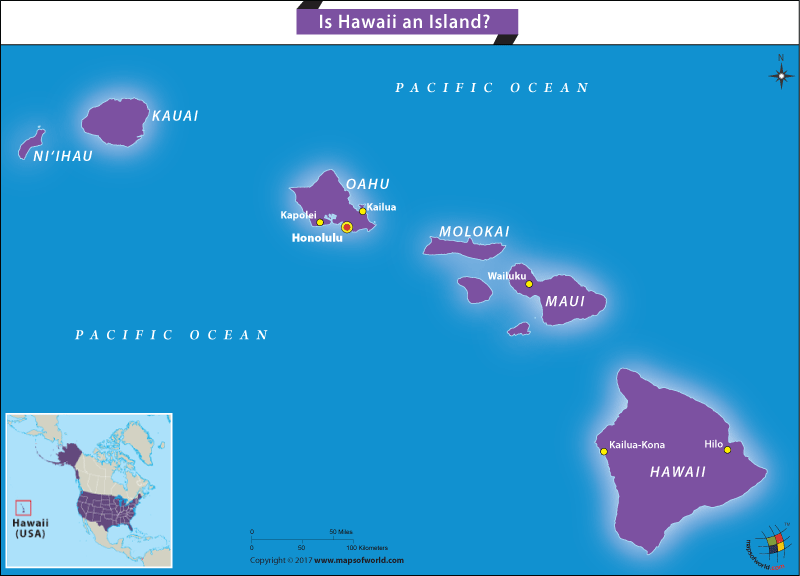Is Hawaii an Island?
Located in the central Pacific Ocean, Hawaii is the only U.S. state which is an island archipelago. It is made up of over 100 islands of which only eight make up the Hawaiian Islands.
The archipelago stretches from Kure Island in the northwest to the Big Island of Hawai’I in the east, encompassing an area of 6,459 square miles. The eight islands which make up this archipelago are – Ni’ihau, Kaua’i, Oahu, Moloka’i, Lana’i, Kaho’olawe, Maui, and the Big Island of Hawai’i.
The Big Island or popularly known as Hawaii, boasts of a massive inflow of tourists every year with over 1.5 to 1.7 million travelers annually, thus making it the third most popular choice in the world among visitors.
Standing true to its name, the Big Island is twice as big as all of the other Hawaiian Islands combined (4,028 square miles). It is also the most recently formed of Hawaii’s Islands and is home to three active volcanoes, with Kilauea enlisted as one of the most active volcanoes in the world.
The diversity of the Big Island is worth mentioning as it breaks all stereotypes of the average tropical Island that is. Out of the 14 climate zones of the world, one can travel through 10 of them on Hawaii ranging from Wet Tropical to Polar Tundra. With such a dramatic size and scope, the big island offers a plethora if activities and out of the world experiences. From extravagant resorts and incredible golf courses to modest local towns and sacred Hawaiian historical sites, from the birthplace of King Kamehameha I to Hawaii’s first missionary church in Historic Kailua Village (Kailua-Kona), the Big Island has something for everyone. The island is a mecca for all kind of adventure seekers as it boasts of a vast variety of land, water and recreational activities such as hiking, riding, snorkeling, scuba diving, kayaking, golfing, bird watching and many more.
The Great Crack is an eight-mile-long (12,875 m), 60-foot-wide (18 m) and 60-foot-deep (18 m) fissure in the island, in the district of Kau and is one of the attractions of the Big island. Reports by the United States Geological Survey (USGS) suggest that the Great Crack is the result of crustal dilation from magmatic intrusions into the southwest rift zone of Kilauea. Visitors can find trails, rock walls, and archaeological sites from as old as the 12th century around the Great Crack.
Apart from the Big Island the archipelago consists of 7 other islands namely: Maui which is the second largest of Hawaii’s main islands and has a total area of 727 square miles. The island’s economy is based mainly on agriculture and tourism and coffee. Macadamia nuts, flowers, sugar, papaya and pineapple are some of the agricultural produce of the island.
The third largest island of Hawaii, Oahu boasts of a total area of 597 square miles and its beaches and shops make it one of Hawaii’s most visited islands. Some of Oahu’s top attractions are Pearl Harbor, the North Shore and Waikiki. Kauai is the fourth largest of Hawaii’s main islands and it has a total area of 562 square miles. The mountains here are more highly eroded and its highest point is Kawaikini at 5,243 feet. Molokai has a total area of 260 square miles and is known for its coral reefs and is home to the world’s longest fringing reef. Lanai is the sixth largest of the main Hawaiian Islands with a total area of 140 square miles. It is also referred to as the Pineapple Island because in the past the island was covered by a pineapple plantation. Niihau is one of the lesser known Hawaiian islands and it is the smallest of the inhabited islands with an area of just 69.5 square miles. Niihau is home to seabird sanctuaries. Kahoolawe is the smallest of Hawaii’s main islands with an area of 44 square miles and is uninhabited. In 1993, the State of Hawaii established the Kahoolawe Island Reserve and today the island can only be used for Native Hawaiian cultural purposes.
Related Maps:





